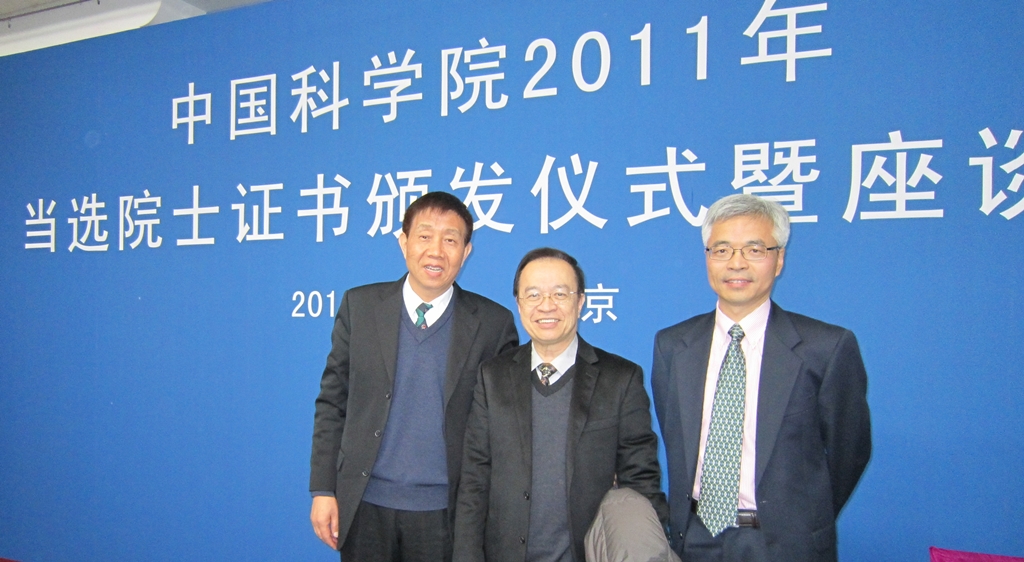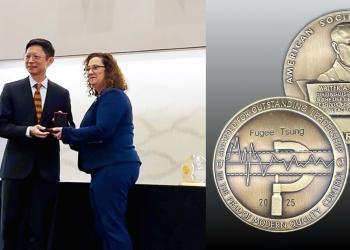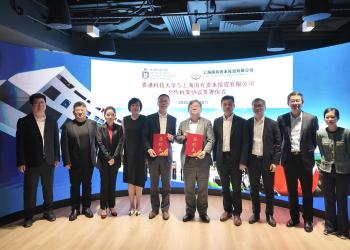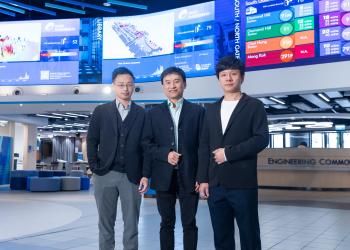Three HKUST Professors Elected Members of Chinese Academy of Sciences
Three professors from the Hong Kong University of Science and Technology (HKUST) have joined the ranks of the nation's best scientific minds. Prof Mingjie Zhang, Chair Professor of the Division of Life Sciences, together with Prof Tongyi Zhang and Prof Ping Cheng, Chair Professor and Professor Emeritus from the Department of Mechanical Engineering, were honored with election to membership of the Chinese Academy of Sciences (CAS) for their outstanding scientific achievements. All three newly admitted Hong Kong scholars are HKUST faculty members.
Membership in CAS is the highest academic title conferred by the Chinese government for achievements in science and technology research. The election of CAS members takes place biennially, with the total number of new members kept under 60 each time, following stringent nomination, appraisal and election processes. Membership is reserved for scientists in the disciplines of natural sciences, technology and engineering.
Prof Mingjie Zhang, Prof Tongyi Zhang and Prof Ping Cheng feel deeply privileged by this honor. Prof Mingjie Zhang gives credit to his research team which includes his students, postdoctoral researchers and laboratory members. He will work with his team to explore the beauty of science. Prof Tongyi Zhang pays tribute to his professors, and the dedication of his colleagues and students. He thanks the University of Science and Technology Beijing for having given him a quality education and HKUST for providing a quality work environment. Prof Ping Cheng gratefully acknowledges the support from the University when he was the Head of Mechanical Engineering Department.
HKUST President Prof Tony F Chan is pleased and proud with this concentration of academic honors on its faculty members whose excellent quality is amongst the key factors for its rise to a top-notch international research university in just 20 years. He reaffirms the University's commitment to aiding socioeconomic development with innovative research. With this triple honor, Prof Chan hopes to make greater strides in Hong Kong-Mainland collaborations and to promote science and technology development.
The profiles of Prof Mingjie Zhang, Prof Tongyi Zhang and Prof Ping Cheng are:
Prof Mingjie Zhang's research area embraces molecular mechanism governing the neuronal signal transduction and molecular basis of protein complexes regulating cell polarity establishment and maintenance. His study has heightened the understanding of several fundamental issues in biology such as synaptic signal transduction complex organization and dynamics of various signaling complex assemblies, and has paved the way towards the theoretical understanding of the pathogenesis of various neurological diseases including stroke, neurological disorders and hereditary deaf-and-blindness. Prof Zhang has published more than 100 papers in world-leading academic journals. This year, his exciting discovery concerning the visual systems of animals detecting light was selected as the cover article of Cell, following his breakthrough discoveries published earlier this year and in 2009 in Science and Cell respectively on how myosin VII and VI lead to hereditary deaf-and-blindness. His research accomplishments have earned him extensive international recognition. In 2002, he won the Outstanding Overseas Young Scientist Award by the National Natural Science Foundation of China, followed by the Croucher Senior Research Fellowship in 2003. He also snagged the Second Prize of the State Natural Science Award in 2006 and the Ho Leung Ho Lee Foundation Science and Technology Advancement Award in mid-2011. He has served as an Advisor on the Overseas Scientific Evaluation Committee of Chinese Academy of Science, as well as Reviewer, Editorial Board Member and Director to a number of international journals and academic institutions. He has trained more than a dozen students in his academic career, many of whom have established their independent research teams around the world.
Prof Zhang received his BSc in Chemistry from Fudan University, Shanghai in 1988 and PhD in Biochemistry from the University of Calgary in 1993. He worked as a postdoctoral fellow at the National Cancer Institute of Canada before joining HKUST in 1995.
Prof Tongyi Zhang is primarily engaged in research on hydrogen embrittlement, fracture and failure of multi-field coupling materials and micro/nanomechanics amongst other areas. In recent years he has proposed surface eigenstress and eigendisplacement models, leading to the nonlinear scaling law for the thickness-dependent Young's modulus under tension, compression and bending. Prof Zhang has published over 100 papers and co-holds two US patents. He is a two-time recipient of the 1987 and 2007 State Natural Science Awards, Second Class, and was presented with the National Award for Young Scientists by the China Association for Science and Technology in 1988. He was elected Fellow of the American Society of Materials International (ASM International) in 2001 and awarded the Croucher Senior Research Fellowship in 2003. Keen on lending his expertise to the wider academic community, Prof Zhang was nominated as the Executive Officer of the International Congress on Fracture in 2009, and was invited to deliver keynote and plenary lectures at the 12th International Conference on Fracture and the 18th European Conference on Fracture respectively.
Prof Zhang received his PhD from the University of Science and Technology Beijing in 1985 before heading to the University of Göttingen, where he worked as a research fellow of the Alexander von Humboldt Foundation. He embarked on postdoctoral research at the University of Rochester in US in 1988 and was appointed an Associate Research Scientist at Yale University from 1990 to 1993. After that he joined HKUST's Department of Mechanical Engineering in 1993 and was later promoted to Chair Professor.
Prof Ping Cheng is a world-renowned researcher in the field of heat transfer with great and far-reaching contributions. He has published over 180 SCI papers in porous-media heat transfer, radiative heat transfer and microscale heat transfer with an h-index of 39. He was elected Fellow of ASME and Fellow of AIAA in 1986 and 2004 respectively. As a testament to his professional achievements, Prof Cheng has received numerous awards including the 1996 ASME Heat Transfer Memorial Award, the 2003 AIAA Thermophysics Award, and the 2006 ASME/AIChE Max-Jakob Memorial Award, considered the highest international honor in the field of heat transfer, and in 2006, he won the ASME Heat Transfer Classic Paper Award. He was also the winner of the 2006 Shanghai Science and Technology Award, First Class, and the 2007 State Natural Science Award, Second Class.
Prof Cheng obtained his BS degree in Mechanical Engineering from Oklahoma State University (1958), his MS degree from MIT (1961) and his PhD in Aeronautics and Astronautics from Stanford University (1965). He was appointed the second Head of Mechanical Engineering Department at HKUST from 1995 to 2002 and became Professor Emeritus in 2003. Prior to joining HKUST, he was Chairman and Professor of Mechanical Engineering Department at the University of Hawaii. He is currently Chair Professor of Mechanical Engineering and Director of Center for Microfluidics and Thermal Control at Shanghai Jiaotong University.
For media enquiries, please feel free to contact :
Mavis Wong
Tel: 2358 6306
Email: maviswong@ust.hk










